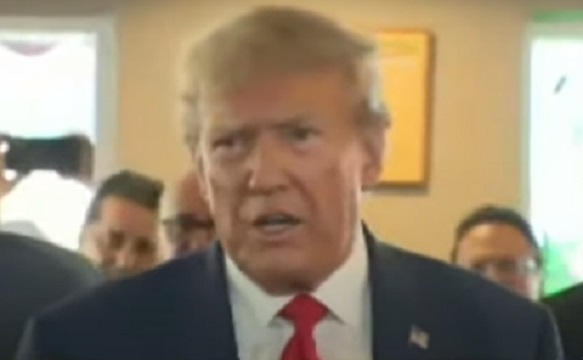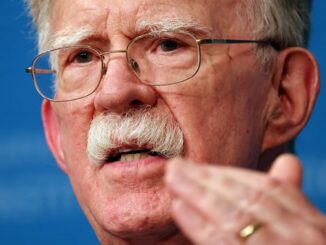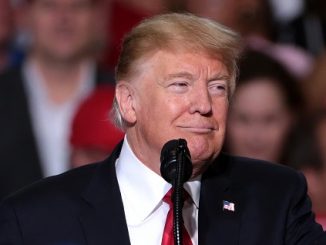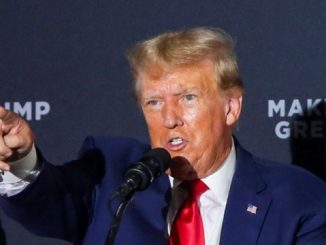
Donald Trump has pleaded not guilty to historic charges of mishandling sensitive files at a federal court in Miami, Florida.
Mr Trump is the first US president – current or former – to be hit with a federal criminal indictment.
Arms crossed, in a dark suit and red tie, he sat in stone-faced silence for his second court appearance this year.
The Republican later travelled to his golf club in Bedminster, New Jersey, where he addressed supporters.
Against a backdrop of American flags, Mr Trump, who is the frontrunner for the 2024 Republican presidential nomination, struck a defiant tone and told the assembled crowd he had “every right” to hold the classified documents, but “hadn’t had a chance to go through all the boxes”.
He said he followed the law and went on to list series of unsubstantiated claims as well as grievances against President Joe Biden and his former rival Hillary Clinton.
Earlier in the day before leaving Miami, Mr Trump, on his social media platform Truth Social, thanked the city for “such a warm welcome on such a sad day for our country”.
Just hours before, in a 13th-floor room of a federal courthouse in downtown Miami, a sombre, subdued Mr Trump looked on while his lawyer entered a plea of not guilty on 37 counts of illegally retaining classified documents and obstructing the government’s efforts to get them back.
“We most certainly enter a plea of not guilty,” the attorney, Todd Blanche, told the judge.
Mr Trump’s co-defendant, Walt Nauta – a close aide charged with six criminal counts in the case – was sitting at the same table as the former president.
On the opposite side of the room sat the entire prosecution team, including special counsel Jack Smith, who announced the indictment last week.
The former president, who turned 77 on Wednesday, was allowed to leave court without any restrictions to domestic or international travel. Prosecutors told Magistrate Judge Jonathan Goodman the defendant was not considered a flight risk.
But Mr Trump will not be allowed to discuss the case with Mr Nauta.
After the hearing, the Republican flashed supporters a thumbs-up as his motorcade left the courthouse. As they drove away, an anti-Trump protester dressed in a prison jumpsuit ran into the street in front of the motorcade before he was pushed away by security – perhaps the most unruly moment of a largely peaceful day.
Mr Trump and his security detail travelled directly to Versailles, a popular Cuban restaurant in Miami’s Little Havana, where he was greeted by a throng of supporters who lined up for photos with the former president.
He appeared to take part in a prayer with some patrons, and was treated to a chorus of Happy Birthday to You.
Alina Habba, a lawyer attorney for the former president, repeated the former president’s claims that the charges were politically motivated as she addressed media outside court.
“We are at a turning point in our nation’s history, the targeting prosecution of a leading political opponent is the type of thing you see in dictatorships like Cuba and Venezuela,” she told reporters.
“What is being done to the President Trump should terrify all citizens of this country,” she added.
Before the hearing, court officials said Mr Trump would not have a mugshot taken but would be digitally fingerprinted and asked to submit a DNA sample by swab.
A trial date has not yet been set, though the case is still earmarked for Aileen Cannon, a federal district judge in South Florida who was appointed by Mr Trump.
The charges, which were made public on Friday, came after FBI agents found more than 100 documents with classified markings at Mr Trump’s private Florida estate Mar-a-Lago in August.
They allegedly contained information about the defence and weapons capabilities of both the US and foreign countries, as well as plans for possible retaliation in response to a foreign attack.
Prosecutors accuse him of hoarding the files, storing some in a ballroom and a bathroom, and of engaging in a conspiracy with an aide to obstruct the FBI’s inquiry.
Mr Trump’s legal troubles appear not to have diminished his support among Republican voters.
A poll by the BBC’s US partner CBS found 76% of likely Republican primary voters were more concerned about the indictment being politically motivated than about the documents posing a national security risk.
Protocol dictates that the Department of Justice, the federal agency that enforces US law, should operate independently from the White House. Mr Biden, who is subject to a separate probe into his own handling of classified files, said last week: “I have never once – not one single time – suggested to the justice department what they should do.”
Legal experts say the criminal charges could lead to substantial prison time if Mr Trump is convicted. He has vowed, however, to continue his campaign for president whatever the verdict.
Mr Trump’s court appearance is his second in less than three months. He was arraigned in April in New York on charges that he falsified business records for a hush-money payment to a porn star ahead of the 2016 election.
Three ways Trump may try to delay or dismiss documents trial
Prosecutors have pushed for a speedy trial now that Mr Trump has appeared in court.
But legal experts say he may try to delay a trial as much as possible.
“He has every incentive to delay,” said Carl Tobias, a law professor at the University of Richmond in Virginia, noting that Mr Trump is campaigning to win the Republican presidential nomination and return to the White House in 2024.
Mr Trump’s arraignment on Tuesday in Miami was standard and procedural. He was booked, finger-printed and swabbed for DNA before he entered a not guilty plea.
He was allowed to leave the court with no travel conditions set for his bail, as he is protected by the Secret Service and is not considered a flight risk.
The next step is to get security clearance for Mr Trump’s lawyers, as the case deals with highly classified documents. “That takes time,” said Kevin McMunigal, a former federal prosecutor and law professor at Case Western Reserve University in Ohio.
Before that happens, Mr Trump will have to get his Florida legal team in order. Two of his lawyers, James Trusty and John Rowley, resigned on Friday, a day after he was indicted.
The former president was represented by Todd Blanche during his arraignment on Tuesday, but experts said he would likely try to include other lawyers who practise in the state.
In the meantime, the court would move forward on selecting the members of the jury that will preside over the case.
Prof McMunigal said federal trials are often quick, with defendants tried within 90 days of their arraignment in most cases. Mr Trump’s case, however, may be an exception due to it being a high-profile case that requires security clearances.
Legal experts maintain that this indictment against the former president is “incredibly strong” and any attempts to dismiss the trial would most likely fail.
“That’s not to say that he and his lawyers won’t drag this out as long as they possibly can,” Prof Tobias said.
Here are three ways they might try to derail the case.
1. Claim there was no crime
Mr Trump has repeatedly argued that he had a right to take the documents from the White House under the Presidential Records Act, and that he had declassified them before leaving office.
His lawyers may try to present this argument before the courts, though Prof Tobias said it is highly unlikely that they would get a favourable ruling.
“I don’t believe he had the right to hold on to them after he was no longer president,” Prof Tobias said. “The Records Act is very clear, and I don’t think there is much question about that.”
2. Claim he is being unfairly singled out
His lawyers may also argue that Mr Trump was a victim of “selective prosecution” – that he was unfairly targeted and that other politicians, namely Hillary Clinton, Mike Pence and President Joe Biden, were never charged for their handling of classified documents.
But Prof Tobias said the former president’s case is different in a number of ways. For one, other politicians were “more than willing” to return whatever documents they had, while evidence in the indictment shows that Mr Trump had resisted.
“The indictment is full of very irresponsible things that Mr Trump allegedly did,” he said, adding the argument of a selective prosecution would not go far before the courts.
3. Try to get key evidence dismissed
Another way Mr Trump and his legal team could try to delay the trial is by seeking to dismiss evidence presented to the grand jury – specifically testimony from Trump lawyer M Evan Corcoran – under attorney-client privilege.
“That might be a pre-trial issue that would cause some delays,” Prof McMunigal said.
But he added that a judge overseeing the case in Washington DC had already ruled the evidence could be included in the indictment under a crime-fraud exception. The exception applies to conversations between a lawyer and a client where a client attempts to get legal advice on how to commit fraud or a crime.
Experts say that even though it is unlikely any of these arguments would throw out the case altogether, they may certainly delay a trial, as the court would have to weigh each issue raised by Mr Trump’s lawyers.
Source: bbc.co.uk






Be the first to comment